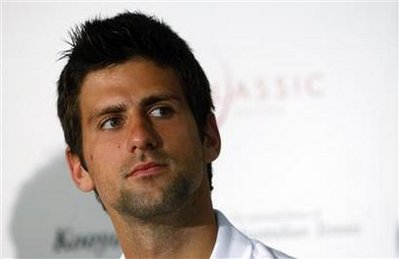Highlights
Djokovic hopes to retire demons at Melbourne Park
(Agencies)
Updated: 2010-01-13 11:08
 |
Large Medium Small |
MELBOURNE - Of the contenders striving for the year's first grand slam at Melbourne Park, Novak Djokovic may have the keenest sense of the razor-thin line between hero and villain that haunts the world's top athletes.
|
 Serbia's Novak Djokovic listens to a question during a news conference, ahead of the Kooyong Classic tennis tournament, in Melbourne, January 12, 2010. [Agencies] |
Two years ago, the Serbian number one was unstoppable Down Under, marching to his maiden grand slam title with a four-set win over French bolter Jo-Wilfried Tsonga.
The world hailed the then 20-year-old as a hero -- and a man to break the grand slam hegemony of Roger Federer and Rafael Nadal. Confetti rained down on him in his home town Belgrade.
Fast forward a year and the party ended abruptly, and more with a whimper than a bang.
Djokovic pulled the pin on his title defence in controversial fashion, retiring midway through a sweltering quarter-final bout against American Andy Roddick, citing heat exhaustion.
Critics seethed and the tag of "quitter" dogged Djokovic, who the previous year had blamed a blister for a retirement against Nadal during the semi-finals at Wimbledon.
A year on, and still chasing an elusive second grand slam title, his painful quarter-final exit at Melbourne remains seared in the Serbian's memory.
In the lead-up to the two weeks of mental and physical stress that mark the season's hottest grand slam, Djokovic conceded the incident was not purely down to fitness, as he had previously been at pains to emphasise.
"Definitely," Djokovic told reporters, when asked whether the retirement would serve as motivation ahead of next week's Open.
"I was facing the role of defending champion of a grand slam for the first time in my life.
"I was going through a lot of tough periods at the start of 2009. I didn't feel 100 percent ready -- physically ready, first of all -- for the tournament.
"And then I changed the racket which has been a huge decision for my side. I think it all reflected on my game and on court ... But this year is quite different and I just hope it won't finish that way."
PACKED SCHEDULE
As if in penance for last year's breakdown, Djokovic promptly ploughed himself into a packed schedule.
When he came up for air after the season-ending ATP Tour Finals in London, he had played a tour-high 97 matches for the season, won five titles and made the final at another five tournaments.
After early exits at Roland Garros, Wimbledon and Flushing Meadows, however, Djokovic still remains esconced at number three in the world and the support act to the rolling Federer-Nadal revue.
While few could question the Serbian's fitness and technique, question marks remain over his mental fortitude.
Emphatic wins over Federer and Nadal in November at the Swiss Indoors and Paris Masters respectively have proved he can mix it with the big boys on tour, but tennis is all about the majors.
To this end, American Todd Martin has been brought in alongside regular coach Marian Vajda to channel the driven Serbian's mental game into a winning formula.
"I felt that after three years of cooperation with Marian Vajda I needed some freshness in the team, and I brought Todd Martin to our team which I think is a good decision because he is first of all a great person, very calm," Djokovic said.
"And he brings his calmness to the team, it's totally opposite from me ... He knows what's the deal on the court. he can help me a lot, he has a lot of experience."
Meanwhile, Djokovic's meticulous physical regime rolls on, with his first hit-out at Melbourne's invitational Kooyong Classic this week following a fitness camp in the Middle East and 10 days of high-altitude training in the Italian Alps.
Apart from a second grand slam victory, the reward for all the hard work could be as much as the world number one ranking -- if Swiss maestro Federer makes an unusually early departure.
And with that would come glory again for Djokovic, and a small measure of redemption.







